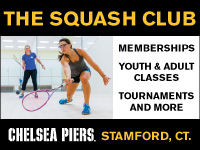Dr. Charles H. W. (Henry) Foster, 1927-2012, 1951 Intercollegiate Individual Champion
by Rob Dinerman for DailySquashReport.com


Dateline October 14--- DailySquashReport.com is sad to report the death last Thursday, October 4th, of Henry Foster, 85, for decades one of the nation’s leading environmental policy experts (including a tenure from 1976-81 as Dean of Yale’s School Of Forestry And Environmental Studies) and the winner of the Intercollegiate Individual crown in 1951. That year, as the senior captain and No. 1 player at Harvard, he also led the Crimson to both the college team title and the USSRA Five-Man Team Championship, the first time in 19 years that a college varsity was able to win an event that for decades during that era had been dominated by the big squash cities like New York, Philadelphia and Boston. He passed away in the same Needham, MA, house where he had been born (and where indeed his FATHER had been born) surrounded by family members after a lengthy and courageous battle with cancer.
Foster was one of the foremost exponents of legendary Harvard coach Jack Barnaby’s cerebral and finesse-oriented approach to the game. Though not capable of generating noteworthy pace, he became during the course of his college career a master at the flicking-twisting game, “holding” the ball until the last possible instant before delivering a shot-making salvo (his favorites being the reverse-corner and three-wall nick) or disconcerting lob. Barnaby used to delight in describing how one of Foster’s opponents, a player of great talent and exceptional speed at a rival institution, suffered sprained ankles in two different matches against Foster due to the frequency and severity with which the latter forced him to whirl, twist and play off balance. Several former teammates also admiringly cited the degree to which Foster “played for his teammates,” i.e. came up with his best performances in dual meets where the team score was very close and his match was crucial to the overall outcome.
Nowhere was this quality more in evidence, or more necessary, than in the final round of the prestigious Five-Man tourney in Chicago (to which the team had travelled by train overnight from Cambridge), where against a favored Philadelphia quintet, and with the team score even at two matches apiece, Foster persevered in five exciting games against Philly’s highly nationally ranked No. 1 Carter Fergusson to clinch the national title for himself and teammates Hugh Nawn, Charlie Ufford, Jim Bacon (later a President of the Met-NY squash association) and Dave Watts. Several weeks later, after completing an undefeated dual-meet season with a convincing team win over Yale, Foster sealed the Intercollegiate Individual event at Williams College with a straight-set final-round victory over his sophomore teammate Ufford, who himself would earn this title in both 1952 and 1953.
Foster would have his moments in post-collegiate play as well, including a run to the U. S. Nationals semis in 1955 highlighted by a quarterfinal win over Diehl Mateer, as well as an early-1970’s foray in which he and older brothers Adam and Hugh, his predecessors as Harvard squash captains in 1948 and 1950 respectively, along with cousins Reggie and Peter, entered the USSRA Five-Man event, whose draw-sheet entry simply read “The Foster Family,” and got to the semis. But by his early 30’s, having by then (in 1953) married Barbara Duchaine, fathered three children and launched what became a truly compelling business career (including being Secretary Of Environmental Affairs in the Commonwealth of Massachusetts) in his chosen field, he started limiting his squash to Boston-area league and tournament play.
In March 1979, he proudly watched from the Naval Academy gallery as his son Jonathan, then the senior captain at Penn, battled one of his own teammates (just as Foster himself had done 28 years earlier) in the finals of the Intercollegiate Individuals, a thrilling match that went to a fourth-set tiebreaker before Ned Edwards was able to barely prevail by an 18-16 margin. Six weeks earlier Jon, currently a wealth-management professional in Los Angeles, had won the John Jacobs portion of the Harry Cowles Invitational at the Harvard Club Of New York, which had to have been especially pleasing to Henry Foster, who had been honored that weekend by being named the tournament’s Honorary Chairman.
The younger Foster, whose own game, based on ferocious pace and flashy shot-making, was far more direct and less subtle than his father’s had been, would be ranked as high as No. 7 on the WPSA pro hardball tour during the 1980’s, while partnering Morris Clothier to the U. S. National Doubles title three straight years from 1993 (the same year that Henry Foster was inducted into the Harvard Varsity Club Hall Of Fame) through 1995, and winning the USSRA 35-and-over hardball title twice and the 45-and-over softball tourney twice as well. One daughter, Susan, an all-American player on several late-1970’s national championship Princeton teams, is a wildlife studies teacher, while the youngest daughter, Dr. Frances Foster, is a professor at the Washington University Law School in St. Louis. They survive Mr. Foster, as do Barbara, his wife of 59 years, and six grand-children.
Back To Main


